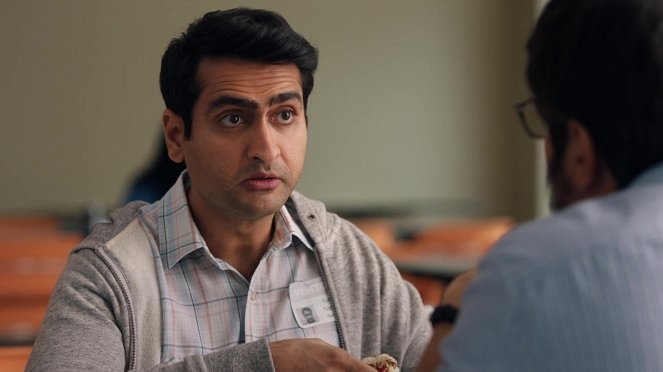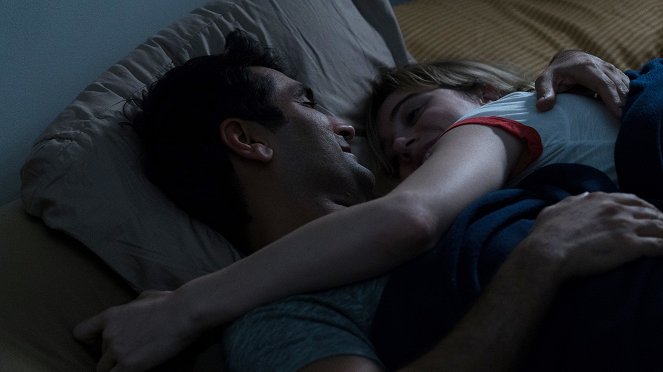Directed by:
Michael ShowalterCinematography:
Brian BurgoyneComposer:
Michael AndrewsCast:
Kumail Nanjiani, Zoe Kazan, Holly Hunter, Ray Romano, Aidy Bryant, Bo Burnham, Adeel Akhtar, Linda Emond, Anupam Kher, Shenaz Treasury, Isabel Shill, Myra Turley (more)VOD (4)
Plots(1)
The movie tells the story of Pakistan-born aspiring comedian Kumail (Nanjiani), who connects with grad student Emily (Kazan) after one of his standup sets. However, what they thought would be just a one-night stand blossoms into the real thing, which complicates the life that is expected of Kumail by his traditional Muslim parents. When Emily is beset with a mystery illness, it forces Kumail to navigate the medical crisis with her parents, Beth and Terry (Holly Hunter and Ray Romano) who he's never met, while dealing with the emotional tug-of-war between his family and his heart. (StudioCanal UK)
(more)Videos (15)
Reviews (11)
The film had a really slow start for my taste. I didn't really get why it was supposed to be a comedy. Ironically, I only got it when things started to get serious and Emily's parents came on the scene. That's when I started enjoying myself and it lasted almost till the end of the film. Almost. The ending was all-American, sappy and predictable and robbed the film of a potential fourth star.
()
A very nicely constructed romantic conversational drama with a delightful final scene and a thematic update in the form of Muslim traditions in the midst of Western society. But my impressions are mixed, on the one hand, there are several times in the first half when the film goes against conventional expectations, moving from traditional romantic formulas to more serious and expansive themes, but then it uses quite unbelievable characters with exaggerated reactions for its social expression, and only the otherwise routine romantic storyline fully works in the end. At times it can be emotional, and in the second half the story surprises again by stubbornly delaying the happy ending, but the cathartic effect is weakened by the fact that easygoing humour is constantly injected into a hugely complex life situation, and the narrative somewhat unthinkingly gives so much space to the parents of the sick Emily, whose life views and attitudes go well beyond intellectual conventions. In any case, it's a very smart film that, unlike most of its contemporaries, has something to say globally and intergenerationally. Very strong 3*.
()
It took me a while to get used to Kumail. For about twenty minutes, I was even pretty uncertain whether this comedy was actually a comedy, or if it was simply an unusual drama. But once Zoe Kazan made an appearance on the scene (or rather in a coma), a whirlwind of great situational humor started that went so natural for Kumail that it really was a pleasure to watch him. For instance, his first encounter with Emily’s parents is really good fun. And there are plenty more similar scenes in the film. Eventually, the unusual drama turns into an unusual dramedy which managed to put me in a really good mood that didn’t disappear even after I finished the movie. The thing is, I read about the film that it was based on a true story and that the main character is the same Kumail as the one in the film. At that point, the movie reached a whole new dimension.
()
The Big Sick is another one of Judd Apatow’s great conversational dramas with a beautifully light and positively conceived
take on the current most pressing issue of Muslims, with a traditionally relatable and well-analyzed relationshiporiented
plot line. The film is emotional and intelligent, with a script worthy of an Oscar nomination. And I think that Zoe
Kazan might get one as well.
()
Of course, there is nothing wrong with films that cater to the tastes of the masses. The fact they want to be liked (even though they may deal with rather painful issues) and do not arouse any antipathy in viewers only puts critics in a non-conformal position, as they are being manipulated. Therefore, I had a similar problem with The Big Sick as I did with last year’s Sundance hit Captain Fantastic. In a film that boldly combines observational comedy about the clash of different genders and cultures (with humour based on commenting on everyday situations in the manner of stand-up comedy) and melodrama, there is less banality and more truth. The first welcome disruption of the romantic-comedy formula is the unexpectedly early break-up, which is not the worst thing to happen in the central couple’s relationship. After the sudden genre shift, a relationship remains the focal point of the film, but it’s not the relationship between the guy and the girl, but between one of the partners and the other partner’s parents. Considerations as to whether the solution is original or cowardly and rather insensitive toward one of the characters are not very relevant, given the knowledge that this is how it actually happened. Though the film does not completely lose its humour after a change of tone, which may be reminiscent of some of James L. Brooks’s comedy-dramas, it is more serious, more moving and less egocentric than other romantic comedies by young filmmakers. The parents are given almost as much attention as the children, whose self-centredness and unreadiness for life are that much more apparent. The unexpected change of perspective, which Aziz Ansari also works with brilliantly in Master of None, leads us, just like the protagonists, to reassess what is really important in life. Emily and Kumail’s inability or unwillingness to perceive the situation that has arisen from the other’s perspective is more thoroughly elaborated in the slightly repetitive final act of this somewhat drawn-out film (which is, however, a shortcoming of most of the films made or produced by Judd Apatow). The filmmakers like to spend time with their characters and let them carry on dialogue often lasting a few minutes longer than is necessary. Most of the time, however, they adhere to the central theme of "love in spite of” and never deviate from the main storyline for so long that the narrative loses traction and starts to be boring. Besides that, they succeed in utilising most of the plot detours in an emotionally powerful climax, where the alternating perspectives make you care not only about the fortunes of the central couple, but also about the many characters around them. 75%
()



Ads